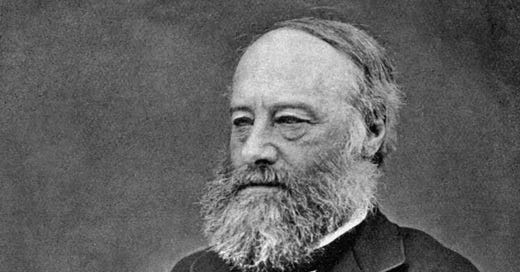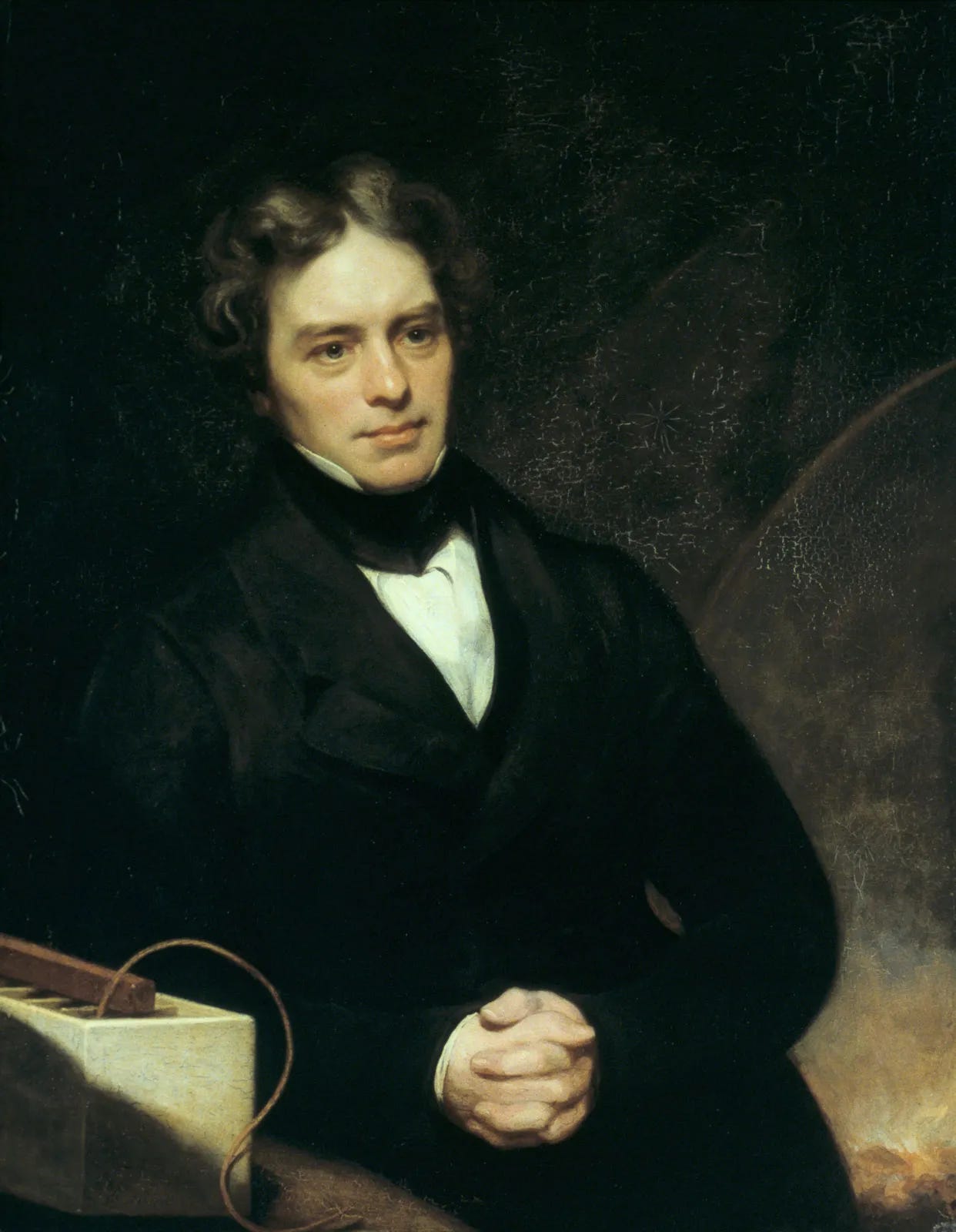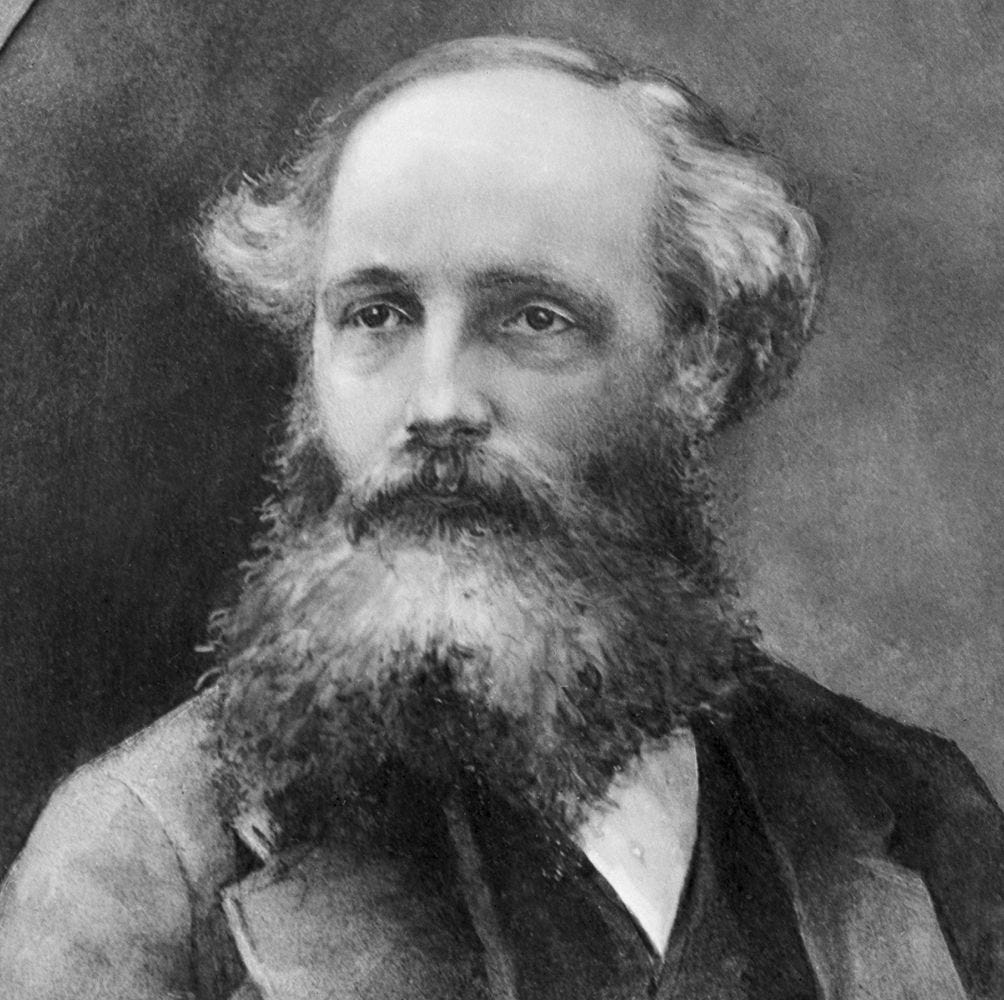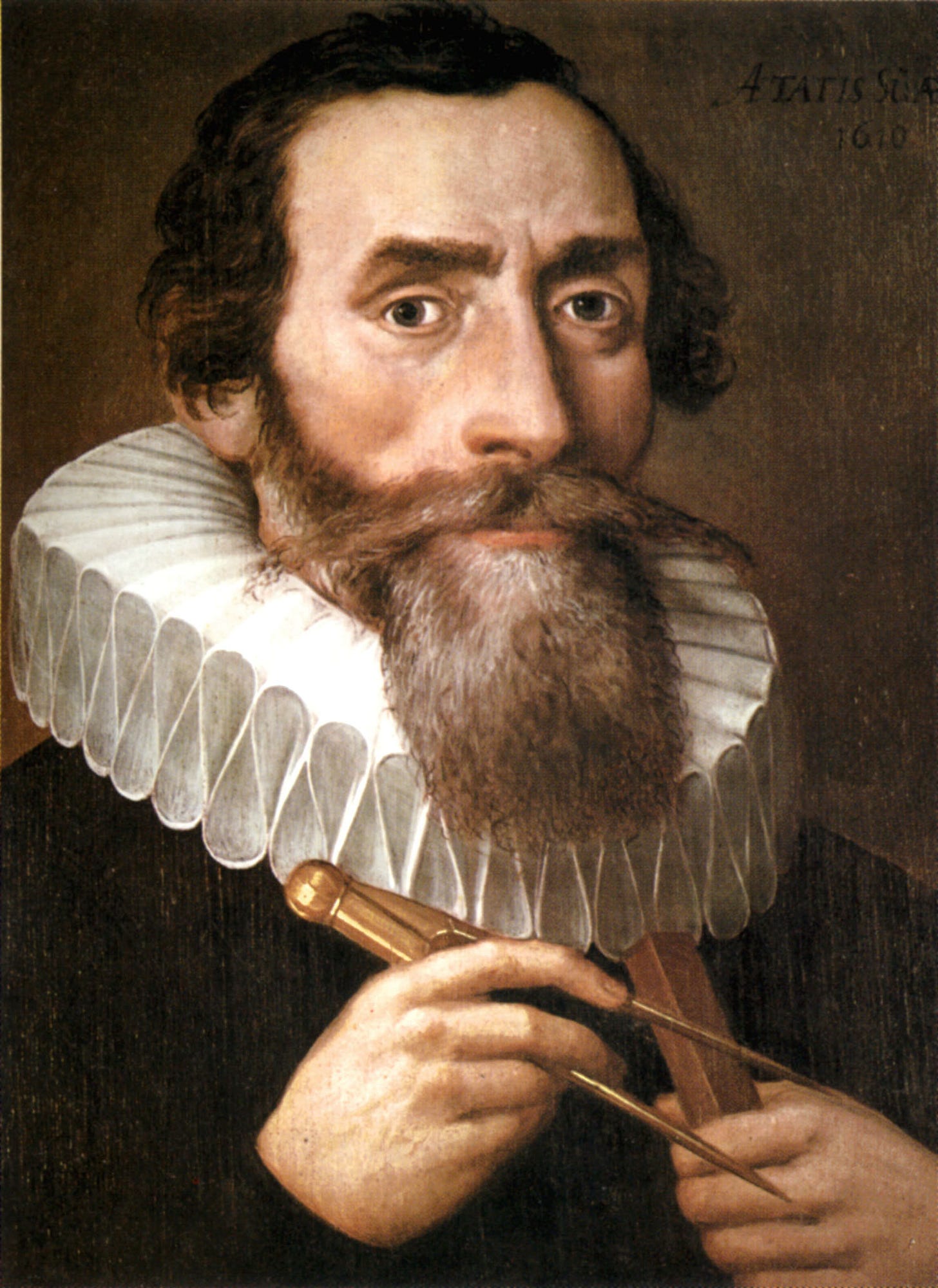Top 10 believing scientists, part 2
Here are some more Christian scientists you should know about
In part 1, we highlighted some impressive believing scientists from history: Galileo, Pascal, Boyle, Leibniz, and Euler.
We continue in part 2 with the next five in the list of top 10 believing scientists. Unlike the first list, which I threw together in no particular order, the order of the top five is kind of intentional. Feel free to disagree. The point is to get to know these incredible scientists.
#5 James Prescott Joule (1818 - 1895)
If you’re a connoisseur of physical units—and who isn’t?—this name will be familiar to you. The standard international unit for energy is the joule, which is of course named after our #5 person, and for good reason.
Joule is probably best known for kicking off the field of thermodynamics when his experiments with heat and mechanical work led to the discovery of the law of conservation of energy. As I frequently remind my first-year physics students, this is a huge deal.
Oddly enough for someone of such distinction, Joule was just a physics hobbyist. His main occupation was managing the family brewery, but he also had a strong interest in experimentation, which he did on the side. When he became interested in modernizing brewery operations with electric motors, this piqued his interest in electricity and heat.
As his interest in this area of physics grew, and presumably in between downing pints of the family beer, he performed a lot of experiments showing the equivalence of heat and mechanical work. At first, he had some difficulty getting the wider scientific community to pay attention to what he was doing, probably because he wasn’t a stuffy academic, but once he got some famous scientists to endorse his results—guys like Michael Faraday and Lord Kelvin—his work eventually got the attention it deserved.
Joule derived his appreciation for God’s work in nature through, among other things, his study of the work of Isaac Newton. There was no such thing as social media or HR back then, so he didn’t know he wasn’t supposed to let his Christian beliefs influence his scientific work. He just went right ahead and used a combination of careful experimentation and theological reasoning—specifically, that only God has the power to destroy energy—to come up with the basis for the first law of thermodynamics.
Joule went on to say—or would’ve said, if he hadn’t been too ill to deliver the speech—to the British Association for the Advancement of Science in 1873:
It is evident that an acquaintance with natural laws means no less an acquaintance with the mind of God therein expressed. To engage in science, far from being contrary, is compatible with our seeking after God.
#4 Michael Faraday (1791 - 1867)
Faraday is a hero to nerds without degrees everywhere, having received little formal education and not being very advanced in his knowledge of mathematics. He was mostly self-taught, and the furthest he ever got with math was algebra and trigonometry. Yet this was enough for him to practically invent the field of electromagnetism, discover that light is an electromagnetic phenomenon, pave the way for electric motors, and become the main reason we have electricity in our homes.
Faraday is so highly regarded as an experimental physicist, that even Einstein went all fanboy and had a picture of him on his wall. Also, how great do you have to be to have a gizmo named after you, especially something as cool as a Faraday cage? And, as if that wasn’t enough, he also has a unit named after him—the farad, which measures electrical capacitance.
You’d think someone like this might be tempted to let it all go to his head, and yet, when he was offered a knighthood for being so clever, he turned it down, because he had no interest in worldly rewards.
Faraday was noted for his belief in the unity of God and nature in the realm of science. When, near the end of his life, he was asked what he thought his occupation might be in heaven, he answered
I shall be with Christ, and that is enough.
I wish I was as legitimately cool at being Christian as Faraday. Is that the best answer anyone could give or what? And it makes me feel like a doofus, because, to be honest, I’d probably have answered something goofy like, “Be the captain of my own personal starship.” But Jesus loves me anyway.
#3 James Clerk Maxwell (1831 - 1879)
Maxwell is responsible for what is arguably the second-most elegant set of equations in all of physics (the first, arguably, is Einstein’s general relativity field equations). I say arguably, because someone, somewhere will always disagree with what you say no matter how reasonable it is.
Anyway, these four equations pretty much cover all of electromagnetism. After the math-noob Faraday came up with the concepts that electricity and magnetism are two sides of the same coin and that light is an electromagnetic phenomenon, Maxwell formalized them mathematically. He also founded the field of electrical engineering, which is the most awesomely, gruesomely difficult field in engineering. (Maybe I should’ve said “arguably,” because someone, somewhere out there is disagreeing with me, but this person is wrong.) If you know someone with a double-E degree, shake his or her hand and congratulate them for their amazing achievement.
Maxwell had a lot to do with the field of statistical mechanics, the roided-up cousin of thermodynamics. If that weren’t enough, he also produced the first color photograph, did important work in statics, dimensional analysis, and chaos theory, solved the mystery of what Saturn’s rings are made of, and paved the way for the emergence of special relativity and quantum mechanics. And he managed to do all of this while being socially awkward and having a thick Scottish accent.
Maxwell was so influential in the development of modern physics that Einstein fanboyed over him even more than he did over Faraday. In fact, physicists generally regard Maxwell as the third-greatest scientist of all time, right after Newton and Einstein.
Like another great scientist we’ll discuss soon, Maxwell was as interested in matters of Christian theology as he was science. From a young age, Maxwell had memorized much of the psalms, and later at Cambridge he joined a secret society called the Cambridge Apostles, where he debated theological matters with members of the intellectual elite.
When he was close to death, Maxwell managed to say something nearly as wonderful as his respected colleague, Faraday
The only desire which I can have is like David to serve my own generation by the will of God, and then fall asleep.
Me, too, Maxwell.
#2 Johannes Kepler (1571 - 1630)
One thing I really appreciate about Kepler is that he was the most prolific producer of quotable quotes about science and God who ever lived. The man was a quote machine. I mean, check this out:
The chief aim of all investigations of the external world should be to discover the rational order and harmony which has been imposed on it by God and which He revealed to us in the language of mathematics. [De fundamentis Astrologiae Certioribus, Thesis XX]
and this
If there is anything that can bind the heavenly mind of man to this dreary exile of our earthly home and can reconcile us with our fate so that one can enjoy living, then it is verily the enjoyment of the mathematical sciences and astronomy. [In a letter to his son-in-law, Jakob Bartsch]
And there’s a lot more where that came from.
Now, for most people, that’s not what Kepler is best known for. If you’ve ever been a college astronomy student, then he’s probably best known for the laws of planetary motion your professor made you memorize. If you’re a history of science buff, then he’s best known for being one of the most influential figures of the Scientific Revolution. Kepler not only came up with the laws of planetary motion, which would go on to influence a certain someone of law-of-gravity fame, but is considered one of the founders of astronomy, optics, the scientific method, modern science in general, and science fiction. That’s quite the pedigree.
Like many of the other key figures of the Scientific Revolution, Kepler worked under the belief that God had created a rational and orderly universe that was accessible to us through our God-given ability to reason. That sort of thing was pretty common back then, because, for better or worse, he and the other figures of the Revolution were born hundreds of years too early to be yelled at by people who believe religious convictions have no place in science and education.
Despite his passion for astronomy and the fact that he was an absolute math boss, Kepler really just wanted to be a Lutheran minister. But because of some obscure theological disagreement I don’t quite remember, the Lutheran church said nope, so he became a teacher instead. During that time, Kepler published some important works, including a book called Mysterium in which he detailed his ideas about heliocentrism. That led to one of the most important collaborations in world history, right up there with chocolate’s collaboration with peanut butter: Kepler’s work with an astronomer named Tycho Brahe. The two had a complex and difficult relationship, but they were motivated to maintain it by mutual need: Tycho’s need for someone with Kepler’s math skills, and Kepler’s need for Tycho’s vast amount of very precise planetary data.
It was from these data that Kepler finally solved the annoying problem of Copernicus’ model not making super-accurate predictions when it came to the positions of the planets. Kepler figured out that God had used ellipses (squashed circles) for the shapes of the planets’ orbits instead of perfect circles. No word yet from God on why he made that particular choice, but presumably he and Kepler have been discussing it for some time now.
Much of Kepler’s life was plagued by sickness, death, disappointment, and displacement. He lived during a time of political turmoil in Europe (then again, when has Europe not been in political turmoil?), and being a penniless nobleman of great intellectual ability meant things were really weird for him and his family depending on who was in power at the moment. Honestly, reading about all the horrible things he experienced makes me feel like a weenie of epic proportions, considering I’ve experienced about 1/78th of what he went through and have probably managed to complain a lot more. And for all that, Kepler was still able to work as passionately as he did and above all to praise God with such admirable effluence and humility:
I give thanks to You, Lord Creator, because You have lured me into the enjoyment of Your work, and I have exulted in the works of Your hands: behold, now I have consummated the work to which I pledged myself, using all the abilities You gave me… [If] I have been drawn by the admirable beauty of Your works into indiscretion, or if I have pursued my own glory among men while engaged in a work intended for Your glory, be merciful, be compassionate, and forgive. [Astronomia Nova]
You make me want to be a better man, Kepler.
#1 Isaac Newton (1643 - 1726/7)
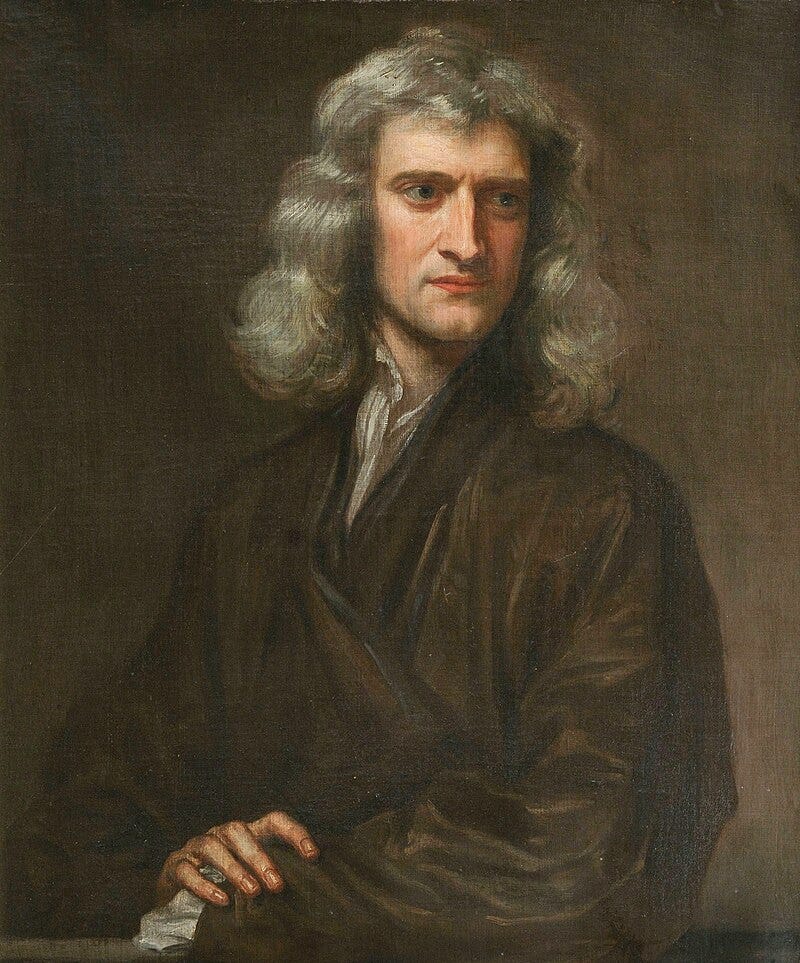
At last, we get to the crème de la crème of scientific excellence.
Isaac Newton is widely regarded as the greatest scientist who ever lived, and, like a few others on this list, he was an annoyingly accomplished polymath. He was involved in mathematics, physics, astronomy, theology, alchemy, geography, and even the Royal Mint.
At an age when most of us were just learning calculus, Newton was already beginning to invent calculus. He then got his bachelor’s degree, just in time for everything to close down due to the Great Plague. During the two years that the Plague raged through Europe, Newton worked in isolation at his country home, and in that time managed to complete his theory of calculus, to make amazing leaps forward in optics, and to formulate his universal law of gravitation.
Newton was quite the math wiz. A partial list of his mathematical accomplishments includes: the binomial theorem, Newton’s identities, Newton’s method, theory of finite difference, and applying logarithms to approximate partial sums of the harmonic series, and his use of power series. If all of that sounds like a lot of blah, blah, blah, just know that math nerds everywhere are having paroxysms of sheer uberfan delight reading it.
Mostly Newton is known for his formulation of the law of gravitation. It’s impossible to overstate the Earth-shaking importance of Newton’s discovery that the force responsible for an apple falling to the ground from a tree is the same force responsible for locking the Moon in its orbit around the Earth. With this discovery, he had truly united the heavens and the earth and showed that space wasn’t a separate realm from the Earth, but that the same laws of nature operated everywhere. Inspired in no small part by Kepler’s laws of planetary motion, Newton formulated his universal law of gravitation. He then went on to formulate his universal laws of motion and basically kicked off the era of classical mechanics and the Industrial Revolution.
Later in life, Newton was appointed as warden of the Royal Mint, a post he took very seriously. Counterfeiting and coin-clipping were serious problems at the time and were threatening to undermine the currency. And so, in a season of life when a lot of retired men were walking their dogs and enjoying a nice view from a café, a very determined Newton was disguising himself as a frequenter of bars and taverns to catch counterfeiters and coin-clippers. Since messing with the currency at that time was considered treason, a lot of currency criminals were executed because of Newton. So, the next time someone who’s intelligent and obsessive enough to invent whole new branches of math and physics retires from his scientific work and is appointed as the warden of anything in government, maybe you should mind your Ps and Qs about it.
A lot has been said about, and argued over, regarding Newton’s particular religious beliefs. Without a doubt, he was extremely religious, and managed to write far more about theology than he did about math or science. In fact, he thought history would remember him for his theological writings rather than for his scientific work, but that has obviously turned out the opposite. In studying Newton’s copious theological works, scholars have discovered that while Newton believed in the divinity of Jesus Christ the Messiah, he had rejected the Trinity. He was so laser-focused on uncovering a true, rational, uncorrupted version of biblical truth that he worried that belief in Jesus as God was a form of idolatry. Just goes to show that having a galaxy-sized brain doesn’t always mean you’re going to be right. I mean, he and a lot of other big brains at the time believed in alchemy and astrology, too.
Nevertheless, Newton was a committed Christian who believed that God was the Creator, the Bible is revealed truth, and that Jesus is the resurrected Son of God. He held the firm conviction that God’s work is evident in nature, going so far as to express this view in his greatest work, indeed one of the greatest works of Western Civilization:
This most beautiful system of the sun, planets, and comets, could only proceed from the counsel and dominion of an intelligent and powerful Being. .. This Being governs all things, not as the soul of the world, but as Lord over all; and on account of His dominion He is wont to be called Lord God. [Principia Mathematica, Book 3]
And with that, we conclude the physics-chauvinist’s top 10 list of believing scientists, pre-20th century edition. I may write another list of top 10 modern physicists who are believers—there are more than you might think.


